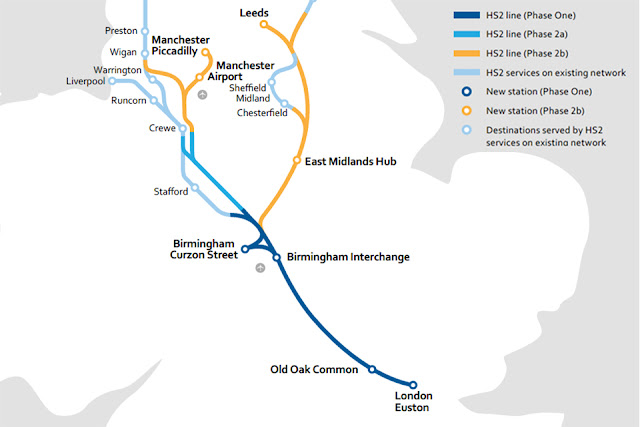HS2 is viewed in many perspectives but why is it being created? Is the aim for profit or to create employment?
HS2 through an economic lens can be seen in many lights. Firstly, the government is investing in the transport systems and this can create employment. Many Construction workers would be needed to help develop this project and thereby increasing the amount of jobs. As its developed, there would need to be maintenance of these trains, train inspectors, ticket employers and many more. This will give more individuals the opportunity to get a job as there will now be more options available.
HS2 doesn’t stop there. It can further stimulate employment. Transportation is one of the determinants of economic development and HS2’s aim is to reduces the north-south divide. Thereby, it becomes a platform where those in Birmingham for example can work in any other part. For example, an individual may have the skills needed for a job in London but due to accommodation charges they may not be able to take the job because they can’t afford it. However; with HS2, they can still stay in Birmingham and pay for rent they can afford and go to London for their work. This benefits the individual because transportation will now become easier. According to the Department of Transport, it will be faster and will reduce drastically than current times.(2) Individuals will also have more potential job opportunities and those in small cities have easier access to larger cities for jobs and leisure.(3) However, it may also be much more expensive since its faster and more development has gone into it. It may also affect local firms because their labor supply would reduce because more individuals may seek jobs in the south instead. (3)
On the other hand, it can also reduce employment. As HS2 is being built, buildings and homes are being torn down and when this occurs employees may lose their jobs and families will also lose their home. Therefore, even though it can be seen in a positive light, it also does damage. The real question is, how much of an economic impact does HS2 do overall? Will it create employment by a high percentage? It doesn’t really. According to the department of transport, it is an estimated increase by 16,000 jobs. (2) and also Using Cost-Benefit analysis may not be as accurate because it is highly uncertain and it depends on assumptions. A well renowned Professor named Thijssen says “His computations state quite clearly- don’t do it. His figures show that the probability that the conditions are going to be right in the next ten years is very, very low.” This portrays a message that though it may be beneficial, in the long run it will not work out as well. (1)
HS2 through an economic lens can be seen in many lights. Firstly, the government is investing in the transport systems and this can create employment. Many Construction workers would be needed to help develop this project and thereby increasing the amount of jobs. As its developed, there would need to be maintenance of these trains, train inspectors, ticket employers and many more. This will give more individuals the opportunity to get a job as there will now be more options available.
HS2 doesn’t stop there. It can further stimulate employment. Transportation is one of the determinants of economic development and HS2’s aim is to reduces the north-south divide. Thereby, it becomes a platform where those in Birmingham for example can work in any other part. For example, an individual may have the skills needed for a job in London but due to accommodation charges they may not be able to take the job because they can’t afford it. However; with HS2, they can still stay in Birmingham and pay for rent they can afford and go to London for their work. This benefits the individual because transportation will now become easier. According to the Department of Transport, it will be faster and will reduce drastically than current times.(2) Individuals will also have more potential job opportunities and those in small cities have easier access to larger cities for jobs and leisure.(3) However, it may also be much more expensive since its faster and more development has gone into it. It may also affect local firms because their labor supply would reduce because more individuals may seek jobs in the south instead. (3)
On the other hand, it can also reduce employment. As HS2 is being built, buildings and homes are being torn down and when this occurs employees may lose their jobs and families will also lose their home. Therefore, even though it can be seen in a positive light, it also does damage. The real question is, how much of an economic impact does HS2 do overall? Will it create employment by a high percentage? It doesn’t really. According to the department of transport, it is an estimated increase by 16,000 jobs. (2) and also Using Cost-Benefit analysis may not be as accurate because it is highly uncertain and it depends on assumptions. A well renowned Professor named Thijssen says “His computations state quite clearly- don’t do it. His figures show that the probability that the conditions are going to be right in the next ten years is very, very low.” This portrays a message that though it may be beneficial, in the long run it will not work out as well. (1)
REFERENCE:
(1) University of York (2016). Has the Economic Case for HS2 Come Off the Rails?
(2) Department for Transport (2013). The Economic Case for HS2. HS2 Ltd. October 2013.
(3) Vickerman, R. (2017). Can High-Speed Rail Have a Transformative Effect on the Economy?, Transport Policy, 1-7.

No comments:
Post a Comment